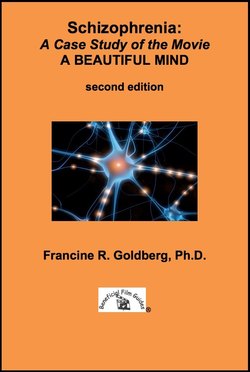Читать книгу Schizophrenia: A Case Study of the Movie A BEAUTIFUL MIND - Second Edition - Francine R Goldberg PhD - Страница 9
На сайте Литреса книга снята с продажи.
The Need to Focus
ОглавлениеThe newly reinforced stress leads John to hold up for two days in the library searching for an original idea and he begins to formulate his original idea. However, once again a high level of stress from competition and isolation trigger John’s hallucination of Charles, the playful friend. The hallucination of Charles allows John to take himself from the library to a social environment to eat, drink beer, play pool and be with his peers.
In this bar scene, in addition to John’s positive symptom experience of the hallucination of Charles, his negative symptoms of schizophrenia are apparent. There is a deficit in John’s fluency and productivity of thought and speech. Specifically, his peers tease him and send him to approach a woman at the bar. However, given his seriously impaired social interactions which he has communicated earlier in his own voice and in the voice of Charles, John approaches this as a mathematical problem, reminding his friends that his odds of success dramatically improve with each attempt. He approaches the woman but is unable to say a word. She breaks the ice and then John says, “I don’t exactly know what I’m required to say in order for you to have intercourse with me....” She, of course, slaps him and leaves. His friends have a good laugh but John is able to comfort himself via his hallucinatory friend, Charles.
John, although brilliant, does not attend classes and has not published any papers. It appears from an earlier conversation that John believes all he has is his mind. However, in this scene John is confronted with possible failure and loss of what he believes is his only asset, his mind. Professor Helinger tells John that he may not get a placement as he did not, “focus.” John’s inability to focus may be an alteration of cognition that is due to his schizophrenia.
Cognition refers to intelligence, memory, academic skills and the ability to use these skills. It is the ability to acquire knowledge, to plan, to make use of one’s perceptions and to reason out problems or difficulties. (Fischler and Booth, 1999, p. 2).
Cognitive impairment is recognized as an integral characteristic of schizophrenia with deficits appearing in tasks that require attention, verbal fluency, memory and executive functioning. These impairments are much more influential on social and vocational functioning and quality of life than are psychotic symptoms of the illness. (Tasman, Kay and Lieberman, 2003, p.242).
Following the high stress of this rejection by his professor and the confrontation of pending failure and loss, John’s symptoms of schizophrenia, negative, positive and cognitive, are invoked.
John’s ability to focus is impaired and he struggles, thinking if he faces the wall rather than the window, he’ll be better able to concentrate. At this point John’s stress reaches a summit and John bellows about, complaining of the expectation of, “…their requirements...to follow their rules, read their books and go to their classes...,” activities that he has probably been unable to partake in because of cognitively impaired concentration and executive functioning.
A note about rejection, failure and loss: These factors increase one’s risk for suicide. Other factors of concern for John that increase suicidal risk include, being unmarried, not working, feeling hopeless, experiencing psychic anxiety, loss of his mental health, and a low level of social involvement/support (Kaplan and Sadock, 1991, p.555).
John’s hallucination of Charles, a positive symptom, appears, as well. An explosive episode occurs as John is caught in an internal struggle between his mathematical brilliance and his cognitive impairments. He acts out his struggle in a fight with himself. (The fight is seen from John’s perspective, so it does not appear to be odd. For John, Charles is real. However, in reality Charles does not exist and John is fighting with himself). In his desperation, his thoughts include suicide, “…go on, bust your head, kill yourself…,” and his behavior includes diminished impulse control, i.e., throwing the desk out the window. However, he is able to attribute those thoughts and actions to Charles, rather than himself. Following each of these actions, the voice of Charles also reinforces John’s belief in himself through words of support, friendship and recognition of John’s brilliance. Thus, John prevails.
From the time of John’s arrival at Princeton University until this point prodromal symptoms of his illness, as mentioned earlier, symptoms prior to the full syndrome –before the full onset of the illness- have appeared which include deterioration in functioning and an increase in positive and negative symptoms.
Kaplan and Sadock (1991, p.333) identify prodromal or residual symptoms as social isolation or withdrawal, impairment in role functioning as wage-earner, student, or homemaker, peculiar behavior (eg., collecting garbage, talking to self in public, hoarding food), impairment in personal hygiene and grooming, blunted or inappropriate affect, digressive, vague, overelaborate, or circumstantial speech, or poverty of speech, or poverty of content of speech, odd beliefs or magical thinking, influencing behavior and inconsistent with cultural norms (e.g., superstitiousness, belief in clairvoyance, telepathy, “sixth sense,” “others can feel my feelings,” overvalued ideas, ideas of reference*), unusual perceptual experiences (e.g., recurrent illusions, sensing the presence of a force or person not actually present) and lack of initiative, interests or energy.
*to be defined later in the text
